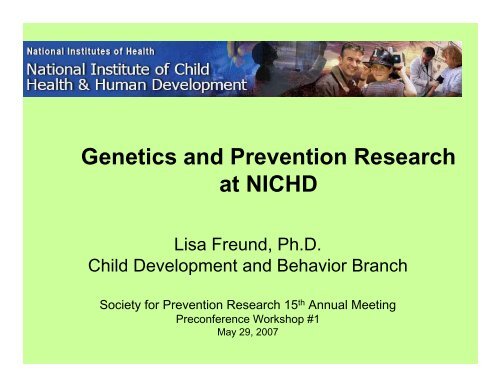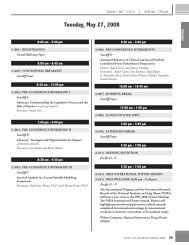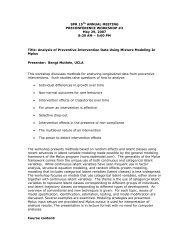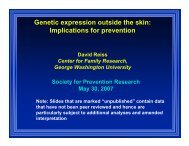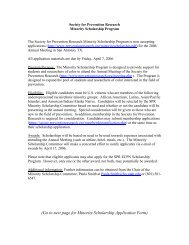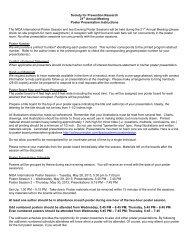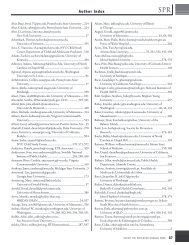Lisa Freund, NICHD - Society for Prevention Research
Lisa Freund, NICHD - Society for Prevention Research
Lisa Freund, NICHD - Society for Prevention Research
- No tags were found...
Create successful ePaper yourself
Turn your PDF publications into a flip-book with our unique Google optimized e-Paper software.
Genetics and <strong>Prevention</strong> <strong>Research</strong>at <strong>NICHD</strong><strong>Lisa</strong> <strong>Freund</strong>, Ph.D.Child Development and Behavior Branch<strong>Society</strong> <strong>for</strong> <strong>Prevention</strong> <strong>Research</strong> 15 th Annual MeetingPreconference Workshop #1May 29, 2007
<strong>NICHD</strong> <strong>Research</strong> Mission:To ensure that every person is born healthy andwanted, that women suffer no harmful effectsfrom reproductive processes, that all childrenhave the chance to achieve their full potential<strong>for</strong> healthy and productive lives, free fromdisease or disability, ensure the health,productivity, independence, and well-being ofall people through optimal rehabilitation.
<strong>NICHD</strong> Strategic Funding PlanBiobehavioral Development <strong>Research</strong>‣ Targets the development of behavioralprocesses and their interrelations withmolecular, genetic, cellular, and neuralsystems, and environmental factors;‣ Strives to understand how theseinterrelations contribute to typical andatypical development;‣ Requires a more integrated researchapproach.
Biobehavioral Studies Should Be Able toAddress…• How behavioral/environmental processesinfluence biological development as well as howbiological factors influence behavioral /environmental interactions;• The impact of culture and early environments onbiology as well as the biological correlates ofbehavioral development.
• Biobehavioral influences on social behavior throughout development• Influences of sex/gender throughout the developmental process• Understanding and facilitating learning in typically and atypicallydeveloping populations• Understanding Adolescence• <strong>Prevention</strong> and intervention of developmental disabilities• Health behavior and risk factors in childhood• Interactions between individual biological processes andenvironment affecting or facilitating development
<strong>NICHD</strong> Program Announcements• PA-07-149 The Science And Ecology Of EarlyDevelopment (SEED) [R01]– How does poverty interact with biological factors in development,and differentially impact neural and psychophysicaldevelopmental systems?– What are the mutual influences of physical health, genetics, andnutrition on child outcomes and how do conditions of povertyinteract with these factors?– How do children's age, gender, and temperament interact withparents' characteristics to influence parenting patterns that affectchild development?
<strong>NICHD</strong> Program Announcements• PA-07-285 Translational <strong>Research</strong> in Eating Disorders(R01)– Biological and behavioral factors that contribute to anorexia,bulimia, and binge eating disorders.– Preventive interventions and effective treatments in populations ofyouth and young adults with eating disorders.– Studies examining the relationships between eating disorders andother health risk behaviors such as substance abuse, self-injuriousbehavior and suicide.
<strong>NICHD</strong> Program Announcements• PA-07-096 Collaborative <strong>Research</strong> <strong>for</strong> Molecularand Genomic Studies of Basic Behavior in AnimalModels (R01)– How maternal behaviors might interact with genetic processesassociated with development of offspring in the short-term, orover the offspring’s lifespan.– Use of animal models <strong>for</strong> investigating gene X environmentinteractions affecting behavior in developmental domains suchas social development, development of resiliency, and cognitivedevelopment.
<strong>NICHD</strong> Program Announcements• PA-07-083 Basic and Translational <strong>Research</strong>in Emotion (R01)– What are the biological (including genetic) and experientialsources of individual differences in emotional reactivity andregulation throughout development?– What are the developmental psychobiological contributions ofstress and other environmental influences (e.g., trauma,violence) on emotional development, regulation, andexpression?
<strong>NICHD</strong> Program Announcements• PA-06-542 Mechanisms, Models, Measurement, &Management in Pain <strong>Research</strong> (R21)– Identification of gene polymorphisms and geneenvironmentinteractions that predict paindevelopment or treatment response.– Risk factors: age, ethnicity, family history, gender,genetic predisposition, lifestyle, occupation, pre- orco-existing mental and physical disorders, and socioeconomicstatus (SES)
<strong>NICHD</strong> Program Announcements• PA-07-140 <strong>Research</strong> on Sleep and Sleep Disorders (R01)• PA-07-060 Methodology and Measurement in the Behavioraland Social Sciences (R01)• PA-07-046 <strong>Research</strong> on Mind-Body Interactions and Health(R01)
Training Mission:• To increase the researchers dedicated tobiomedical, biobehavioral or behavioral approaches<strong>for</strong> understanding and improving:– Typical development from conception through youngadulthood– Developmental disabilities or disorders and interventions– Influences of family, peers, school, culture andpopulation dynamics on developmental outcomes– Pregnancy and perinatal health outcomes• NRSAs, K-career awards, diversity supplements
Currently Funded Studies• The Early Growth andDevelopment Study• Reiss, David/ Leve, Leslie;Oregon Social Learning Center– To detail mechanisms bywhich genetic factors andparent-child relationshipscombine to ifluence thedevelopment of children acrossthe toddler transition.Currently looking at thetransition into kindergartenand first grade.
Currently Funded Studies• Genetics of General andSpecific Math Disabilities• Petrill, Stephen; Penn State– Genetic and environmentalmechanisms that underlieindividual differences ingeneral and specificmathematics cognition—a twinstudy.
Currently Funded Studies• Age at First Sex, Genes,Religion, and Other SocialInfluencesGuo, Guang; UNC, Chapel Hill– The goal of this proposedproject is to identify theinfluences of genetic andenvironmental factors andtheir interactions on riskysexual behavior in adolescenceusing a sub-sample of about2,600 participants of theNational Longitudinal Study ofAdolescent Health (AddHealth)
Currently Funded Studies• Genetics, SchoolEnvironments andCognitive Development• Plomin, Robert; Kings College,London– This 4-year project is testingthe hypothesis that genes playa part in mediating the effectsof the school environment oneducationally relevantbehaviors, that is, that childrenactively select, modify andcreate environments that arecorrelated with their geneticpropensities.
How to survive in an economicallychallenged grant environment• Plan well ahead and call Program• Keep it smaller rather than larger– Under $500k per year direct costs– Utilize competitive supplements or multiplesmaller grants• Request dual assignment• Expect resubmissions
<strong>Lisa</strong> <strong>Freund</strong>, Ph,D.Child Development and Behavior BranchPrograms in Developmental CognitivePsychology, Behavioral Neuroscience,and PsychobiologyVoice: 301-435-6879Email: freundl@mail.nih.gov


